Kenneth L. Gentry Jr.'s Blog, page 21
November 17, 2023
LUCIFER?
PMW 2023-090 by Kenneth L. Gentry, Jr.
Isa. 14:12 is a little understood text. The KJV’s translation has the word “Lucifer” here. “Lucifer” (“light-bearer”) is the Latin Vulgate translation of the Hebrew helel, which means “shining one.” This translation has helped promote a radical misunderstanding of the text in the modern world.
“How art thou fallen from heaven, O Lucifer, son of the morning! how art thou cut down to the ground, which didst weaken the nations!” (KJV)
Despite popular opinion today (and by many ancient and medieval writers), Lucifer is not Satan. Notice: (1) The taunt is clearly directed against “the king of Babylon” (v. 4). (2) It speaks of the fall of “the man who made the earth tremble” (v. 16), who has “ruined your country” (v. 20). (3) It associates him with other earthly kings who have died (vv. 18–19). (4) It speaks of his burial problem (v. 20). (5) Furthermore, this taunt-oracle opens a series of prophecies against various earthly kings: Babylon (14:4), Assyria (14:24), Philistia (14:29), Moab (15:1), Damascus (17:1), Egypt (19:1), Jerusalem (22:1, 9–10), and Tyre (23:1). It would be out of keeping with the series to import Satan into this taunt.
Unfortunately, much confusion arises from not properly dealing with the poetic genre in which this oracle appears. Poetry allows extravagant description such as applied here to “Lucifer” (i.e., the king of Babylon). In the very context we read of trees rejoicing and speaking (14:8a) because war ceases with his death (v. 7) so that trees will no longer be cut down to make siege weapons (v. 8b).
 Contemporary Theological Issues
Contemporary Theological Issues
by Ken Gentry (21 mp3 downloadables)
A Christian college course dealing with contemporary theological debates within the church. Covers several important topics of concern to Christians, including abortion, homosexuality, alcoholic beverages, and more
See more study materials at: www.KennethGentry.com
“Lucifer” is better translated as “shining one,” referring to Venus, the morning star (as per the NASB and NRSV; similarly, ASV, ESV, NIV, RSV). This fits well with the astrological and polytheistic commitments of the Babylonian king who sought to raise himself above all others.
Isa. 14:12: How you have fallen from heaven, / O star of the morning (NASB)
In antiquity the collapse of a great political leader or nation is often called a fall from “heaven.” We see this in Cicero, ad Atticum 2:21; Philippicum 2:41; Horace, Epodes 17:41; etc.
Isa. 14:13–14: you said in your heart, / I will ascend to heaven
In these two verses we hear the Babylonian king’s proud boasting: we read “I” five times. And we see multiple references to height: “ascend,” “heaven,” “above the stars,” “sit on the mount,” “above the heights of the clouds,” and his desire to be “like the Most High.” He was determined to sit regally in the “mount of assembly” of the gods in “the north [Heb., saphon].” In Ugaritic poems, Saphon is the place where Baal is enthroned.
Isa. 14:15: you will be thrust down to Sheol, / To the recesses of the pit
For all the king’s wordy boasting, God quickly disposes of him. In vv. 13–14 his lengthy boast employed eighteen words in Hebrew, whereas God only uses five Hebrew words to discard him (v. 15). All of his pompous boasts of ascending the heights are replaced with the lowest places where he will actually end up: He will be “thrust down,” “to Sheol,” even to the “recesses of the pit” (v. 15). When man attempts to be equal with God, his fall into ruin is sure (cf. Gen. 3:5, 16–24; Eze. 28:2, 6–10).
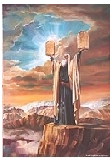 Revelation, God and Man
Revelation, God and Man
(24 mp3 lectures by Ken Gentry)
Formal Christ College course on the doctrines of revelation, God, and man. Opens with introduction to the study of systematic theology. Excellent material for personal study or group Bible study. Strongly Reformed and covenantal in orientation.
See more study materials at: www.KennethGentry.com
Isa. 14:18–20: you have been cast out of your tomb
In antiquity burial monuments for kings were important, as we may discern from the most remarkable ones, the Egyptian pyramids. Hence, “all the kings … each in his own tomb” like in glory. But the Babylonian king will not be accorded a decent burial, becoming instead like a “trampled corpse” (vv. 18–19).
November 14, 2023
A STANDARD FOR THE NATIONS
PMW 2023-089 by Kenneth L. Gentry, Jr.
Isaiah provides us with a glorious and encouraging Messianic prophecy in Isaiah 11. Let us quickly summarize his teachings.
Isa. 11:1–2: a shoot will spring from the stem of Jesse
Along with Assyria, Israel has been chopped down to a stump (10:18–19, 33–34). Yet the Messiah, the true Davidic king, will arise from the lineage of Jesse (vv. 1, 10; David’s father, 1 Sam. 16:10–31). Christ is the greater David who was typified in David. He will be endowed with “the Spirit of the LORD” (v. 2), thereby exercising wisdom, understanding, counsel, strength, knowledge, and the fear of the LORD (v. 2).
Isa. 11:3–6: with righteousness He will judge the poor
Where Israel’s rulers failed and earned God’s judgment, the Messiah will exercise righteous rule (cf. v. 9).
Isa. 11:6–8: the wolf will dwell with the lamb
This is poetry; it is not speaking literally of wolves, lambs, leopards, lions, and bears. These carnivores acting peacefully with herbivores picture the glory of Christ’s kingdom when it comes to full expression in history. In Christ enmity is done away with and replaced by reconciliation (cf. Eph. 2:14–18).

Sovereignty of God
(7 mp3 Gentry downloadable sermons)
In these seven sermons will be found a practical demonstration of God’s absolute sovereignty.
This series serves as an excellent introduction to this difficult doctrine.
See more study materials at: KennethGentry.com
Isa. 11:9–10: the earth will be full of the knowledge of the LORD
Worldwide peace will eventually prevail on earth as the gospel gradually wins more converts (see 2:3–4 Note; 9:7a Note). This is what Christians pray for when we pray “Your kingdom come, Your will be done on earth” (Matt. 6:10) and what we aim for in promoting the great commission (Matt. 28:18–20). But this prophecy will come to fullest, perfect expression in eternity, when God establishes the consummate new heavens and new earth (2 Pet. 3:13) after the final judgment (2 Pet. 3:10–12).
Isa. 11:11–16: the Lord / Will again recover … / The remnant of His people
Once again the hope of the remnant is presented: despite his vigorous judgments, God will not destroy Israel. She will live on in a remnant that becomes the new covenant church (Eph. 2:11–22), which is “the Israel of God” (Gal. 6:15). Thus, the new covenant church is not a replacement for Israel, but the fulfillment of Israel for in her “all Israel will be saved” (Rom. 11:26).
Isa. 11:12: a standard for the nations
A “standard” (or “banner”) is some sort of sign or signal that is lifted up to rally troops to assemble (cf. v. 10; 13:2; 49:22–24). Once again we see the universality of God’s plan: he will ultimately include the Gentiles (“the nations,” cf. Isa. 19:20–25; Matt. 28:18–20; see Notes at Gen. 12:3; Isa. 2:2–4; 9:7a; 11:12; 18:7).
 Theological Debates Today (5 mp3 messages)
Theological Debates Today (5 mp3 messages)
Conference lectures on contemporary theological issues: 1. The Great Tribulation; 2. The Book of Revelation; 3. Hyperpreterism; 4. Paedocommunion; 5. God’s Law. Helpful insights into theological truths that are vigorously debated among Christians. Excellent tool for personal or group Bible study.
See more study materials at: http://www.KennethGentry.com
November 10, 2023
KINGDOM GRADUALISM
PMW 2023-088 by Kenneth L. Gentry, Jr.
God’s redemptive kingdom develops gradually over time, unfolding incrementally. It begins small and will eventually grow to dominance. In a number of verses, we can see this principle of gradualism in God’s providence.
An historical indicator of kingdom gradualism appears in the Promised Land’s conquest. In Deuteronomy 7:22 we read: “And the Lord your God will clear away these nations before you little by little; you will not be able to put an end to them quickly, lest the wild beasts grow too numerous for you.” Here Moses specifically informs Israel that gradual conquest is for her good, allowing her people to conquer where they could secure and maintain control.
In Daniel 2:31–45 Christ’s kingdom comes down to earth as a stone smiting the world kingdom, which exists under a fourth imperial rule. As we read through the passage we learn that the kingdom grows to become a great mountain in the earth: “You watched while a stone was cut out without hands, which struck the image on its feet of iron and clay, and broke them in pieces . . . . And the stone that struck the image became a great mountain and filled the whole earth” (Dan. 2:34–35).
The Truth about Postmillennialism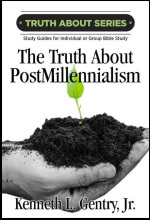 By Ken Gentry
By Ken Gentry
A group Bible study guide for explaining the optimistic prophetic hope for this world to be accomplished before Christ’s Second Coming. Establishes the postmillennial system in both the Old and New Testaments. Touches on key eschatological issues, such as creation, covenant, interpretive methodolgy, the great tribulation, the Book of Revelation, the Jewish Temple, and more. It presents and answers the leading objections to postmillennialism.Twelve chapters are ideal for one quarter of Sunday School.
See more study materials at: www.KennethGentry.com
In Ezekiel 17:22–24 God promises to establish the kingdom as a small “sprig from the lofty top of the cedar.” Then he will nurture it until it becomes “a stately cedar.” It produces great boughs so that “birds of every kind will nest under it.” This growth is certain for “I am the LORD; I have spoken, and I will perform it.”
In Ezekiel 47:1–9 redemption flows forth from God’s temple in stages. The waters of life initiate from under the altar, first “to the ankles” (v. 3), then to the knees (v. 4a), then to the loins (v. 4b), then it “was a river that I could not ford” (v. 5). This is the river of life (v. 9).
In Matthew 13 the Kingdom Parables speak of the kingdom’s increase in size and transformational influence. Matthew 13:3–9 portrays the kingdom as scattered seed that gradually grows to bear abundant fruit. Matthew 13:31–33 speaks of its growth as that of a mustard seed becoming a great plant and as a little leaven leavening three bushels of meal. In Mark 4:26–29, God’s kingdom begins as mere seed (v. 26), then it puts forth the blade, then the head, and the mature grain (v. 27).
Amillennialism v. Postmillennialism Debate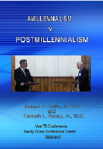 (DVD by Gentry and Gaffin)
(DVD by Gentry and Gaffin)
Formal, public debate between Dr. Richard Gaffin (Westminster Theological Seminary) and Kenneth Gentry at the Van Til Conference in Maryland. The debate focuses on whether the church is called to perpetually suffer in history.
See more study materials at: www.KennethGentry.com
In Romans 13:11–14 and 1 John 2:8 the apostles see the kingdom light as already shining, ready to dispel the darkness. “The manifestation of the Messiah is regularly termed by the ancient Jews yom, day, because previously to this all is night.” “The apostle considers the state of the Gentiles under the notion of night, a time of darkness and a time of evil practices. . . . He considers the Gospel as now visiting the Gentiles, and the light of a glorious day about to shine forth on them.”
Satan will not be able to thwart the kingdom’s progress and growth, for the “gates of Hades will not be able to prevail against it” (Matt. 16:18). Though slow, it will advance in God’s good time.
November 7, 2023
PSALM 45 AND THE MESSIAH
PMW 2023-087 by Kenneth L. Gentry, Jr.
Psalm 45:1–7 is a royal wedding hymn psalm. It engages in praise that is so exalted that it is primarily Messianic in function. However, it could apply to an earthly king in an ideal sense as the goal at which his rule should aim. Yet its Messianic purpose is the ancient view among both Jewish and Christian interpreters. We even see its Messianic function in the New Testament (Heb. 1:8–9). In this regard, notice the following.
The title of this Psalm is the longest by far in all the Psalms: “For the choir director; according to the Shoshannim. A Maskil of the sons of Korah. A Song of Love.” This emphasizes its deep and solemn significance in presenting the glorious wedding hymn — for the Messiah.
“Shoshannim” means “lilies,” a beautiful flower that was used in the temple (cp. 1 Kgs. 7:19, 22, 26). As a plural it seems to refer to the beauty of the corporate bride, the people of God. Thus, we see several female figures in the psalm (vv. 9, 10, 15). That it is a “song of love” comports with its wedding function, showing his love for the bride. This theme is taken up also in the Song of Solomon.
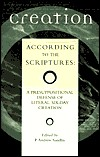 Creation according to the Scriptures
Creation according to the Scriptures
Ed. by P. Andrew Sandlin
This book is sub-titled: A Presuppositional Defense of Literal , Six-day Creation. It has chapters by R. J. Rushdoony, Andrew Sandlin, Kenneth Gentry, Cornelius Van Til, and others. It touches on historical, exegetical, theological, and philosophical implications of Six-day Creation.
See more study materials at: www.KennethGentry.com
It is further noted that the psalm was a “Maskil.” This is a technical term signifying its instructional purpose. This pedagogic function suggests its pointing to something of great significance (i.e., the Messiah) rather than simply being a joyful wedding song.
This hymn offers such high praise of the King, that it must point beyond any earthly king to someone greater. Any earthly king would be but a type of the Messianic King (for “type” my previous article). It declares this King is full of beauty and grace (v. 2; cp. John 1:14) and is a righteous conqueror for the cause of truth (vv. 4–5). This fits well with the New Testament revelation of the “marriage supper of the Lamb,” who goes forth to conquer as one who is “True” (Rev. 19:9–11). The marriage of God to his people is frequently noted in Scripture (Isa. 44:5; 62:4–5; Jer. 3:1; Eze. 16; 23; Matt. 9:15; 22:2; 25:1; John 3:29; Rom. 7:4; 2 Cor. 11:2; Eph. 5:25–32; Rev. 19:7; 21:2; 22:17). See especially Hosea 1–3.
The King is expressly addressed as divine: “Your throne, O God.” And his rule is emphatically declared to be “forever and ever” (v. 6; cp. Luke 1:32–33). He will be praised “forever and ever” by all peoples (v. 17). That is, all nations shall come to him and praise his name forever (Psa. 22:27; 86:9; Isa. 2:2–4).
[image error]For more information and to order click here.
" data-image-caption="" data-medium-file="https://postmillennialismtoday.files...." data-large-file="https://postmillennialismtoday.files...." class="alignright size-full wp-image-495" src="https://postmillennialismtoday.files...." alt="" />God Gave Wine (by Ken Gentry)
A biblical defense of moderate alcohol consumption. Considers all key biblical passages and engages the leading objections.
See more study materials at: www.KennethGentry.com
November 3, 2023
BIBLICAL TYPOLOGY
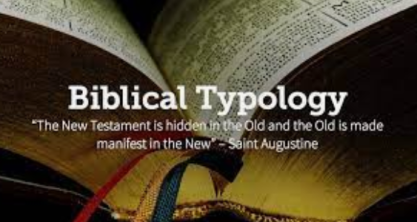 PMW 2023-086 by Kenneth L. Gentry, Jr.
PMW 2023-086 by Kenneth L. Gentry, Jr.
A biblical “type” is an Old Testament person, event, or institution that serves as an anticipation of a greater New Testament person, event, or thing, which is known as an “anti-type.” The Old Testament type is a God-ordained matter that is intentionally designed as a pointer to its future, greater “fulfillment.” Thus, Scripture often engages in a recurring pattern of divinely-ordained relationships between the Testaments.
True “types” are not just accidental similarities which we may develop by our own interpretive ingenuity. They are God-ordained similarities that are purposely embedded in Scripture and serve a significant theological purpose. The type may not be understood initially by the saints in the Old Testament, but they are finally demonstrated as such in the New Testament, usually through specific confirmation.
The idea of a type is expressly stated in the case of Adam and Christ (Rom. 5:14). Paul especially focuses on the Adam/Christ typology in his writings (Rom. 5:12–14; 1 Cor. 15:20–22). Some prominent type/anti-type characters pointing to Christ: Adam (Rom. 5:14), Melchizedek (Heb. 5:6, 10), Moses (Acts 3:22), and David (Acts 2:29–36). Other types clearly established by New Testament confirmation include Noah’s ark as a pointer to baptism (1 Pet. 3:21), the tabernacle as a type of heaven (Acts 7:44; Heb. 8:5), and Israel’s wilderness experience as a type of the New Testament church (1 Cor. 10:6, 11).
The Beast of Revelation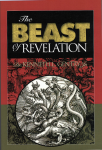
by Ken Gentry
A popularly written antidote to dispensational sensationalism and newspaper exegesis. Convincing biblical and historical evidence showing that the Beast was the Roman Emperor Nero Caesar, the first civil persecutor of the Church. The second half of the book shows Revelation’s date of writing, proving its composition as prior to the Fall of Jerusalem in A.D. 70. A thought-provoking treatment of a fascinating and confusing topic.
For more study materials, go to: KennethGentry.com
Typological interpretation is not equivalent to allegorical interpretation. Allegorical interpretation looks for additional meanings in a text in addition to the actual historical meaning. But biblical typology affirms (even requires!) the historical meaning and reality of the Old Testament person, event, or institution involved. So, in typology the meaning of an original Old Testament text takes on a greater significance in the unfolding plan of God as redemptive history comes to a climax in the New Testament.
Biblical typology is an interesting feature of Scripture. However, types can be abused: we need always to be careful to engage the proper elements of types before we assert a type. When I was studying at Grace Theological Seminary in 1974, Dr. Charles Smith once confessed to hanging a sign on a Dallas Seminary Professor’s office door which stated: “Come to typing clase and see how many types you can word per minute.” He was frustrated with the overuse of typology by some of the students.
Charismatic Gift of Prophecy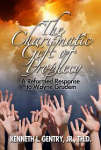
(by Kenneth Gentry)
A rebuttal to charismatic arguments for the gift of prophecy continuing in the church today. Demonstrates that all revelatory gifts have ceased as of the conclusion of the Apostolic era.
See more study materials at: www.KennethGentry.com
October 31, 2023
THE SONS OF GOD IN GENESIS 6
PMW 2023-085 by Kenneth L. Gentry, Jr.
The episode occurring in Genesis 6:1–4 is quite difficult to interpret and has been the subject of much debate. Though there are several interpretations of this passage, historically two views have dominated the debate: (1) the angelic offspring view and (2) the human seed-line view.
Though the seed-line view is the traditional Christian understanding, perhaps the oldest view in extra-biblical antiquity is the angel-human interpretation. It is found as far back as 200 B.C. in the non-biblical book of 1 Enoch (6:11–7:6) as well as in the first-century book by Josephus called Antiquities (1:3:1). This view holds that fallen angels came down to earth and engaged in sexual relations with women who then bore giants as their offspring.
The seed-line view holds that the godly line of Seth (4:25) that has been the focus of Genesis since Genesis 5:3 is beginning to intermarry with unbelieving women (“whomever they chose” without reference to their faith. These women would be largely represented by the Cainite line (4:17ff). This appears to be the proper interpretation due to its fitting the context and avoiding bizarre results.
THE ANGEL VIEW
The angel interpretation is based on the following main lines of evidence: (1) The “sons of God” is a reference to angels, as we can see in Job 1:6; 2:1; 38:7. (2) The word “Nephilim” (6:4) signifies giants, which may be the case in Num. 13:33. (3) Passages such as 1 Peter 3:19–20; 2 Peter 2:4; and Jude 6–7 support this interpretation.
Nevertheless, the evidence for this angelic interpretation is unpersuasive for the following reasons:
(1) The concept “sons of God” can certainly mean angels, but it can also refer to God’s people (Exo. 13:15; Jer. 3:19; Gal. 3:26; see further discussion below). Besides, Genesis has not mentioned angels to this point, so that their sudden appearance would be surprising. But in the final analysis, the beings in Genesis 6 could not be fallen angels and associates of Satan, for they would not be called “sons of God.”
Have We Missed the Second Coming: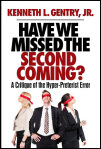
A Critique of the Hyper-preterist Error
by Ken Gentry
This book offers a brief introduction, summary, and critique of Hyper-preterism. Don’t let your church and Christian friends be blindfolded to this new error. To be forewarned is to be forearmed.
For more Christian educational materials: www.KennethGentry.com
(2) The word “Nephilim” (a rare term occurring only three times in Scripture) literally means “fallen ones” and can therefore apply to notorious sinners. Its verbal form (“fall”) occurs scores of times suggesting its ethical meaning.
(3) The New Testament passages do not mention any cohabitation of angels with women, and certainly not their marrying them. 1 Peter 3:19 does not mention angels, but is referring to the evil men in Noah’s day. The other two New Testament passages refer back to the original fall of angels, not something that occurs later in Genesis 6.
(4) The fact of giants being mentioned in the context of the Nephilim does not help the argument. We see other giants in the Bible, such as the Emim (Deut. 2:10–11), the Zamzummim (Deut. 2:20–21), king Og of Bashan (Deut. 3:11), Goliath (1 Sam. 17:4–7), and more, yet no one claims that they were the offspring of angels.
The following additional problems arise for the angelic view: (1) Jesus teaches that angels do not marry (Matt. 22:30; Mark 12:25), though Genesis 6:2 speaks of these “sons of God” taking wives (cp. 4:19; 11:29; 12:19; 31:50). Genesis 6 is not speaking of fornication, but of settled marriage. Only in this one difficult passage in Scripture do we have anything suggesting angels marrying humans. (2) Angels are a different order of being in that they are spiritual beings (Heb. 1:14). When they assumed visible, tangible form they would do so only for a time and surely would not possess human DNA allowing for procreation while dwelling on the earth. (3) In Genesis 6 God’s judgment is directed against men, not the alleged angels (6:3, 5–6, 13).
THE SEED-LINE VIEW
The proper interpretation sees in this episode the inter-marrying of the godly line of Seth with unbelievers, particularly represented by the depraved line of Cain. This fits perfectly with the contextual flow of Genesis to this point. Genesis is structured by toledoths (“genealogies”) showing its interest in genealogical progress (see 2:4 Note). In fact, the two genealogies surrounding Genesis 6 are found in Genesis 5 and Genesis 10–11. They are specifically designed to link Adam to Noah, then Noah to Abram whose genealogical offspring will dominate Genesis from chapters 12 to 50.

As It Is Written: The Genesis Account Literal or Literary?
Book by Ken Gentry
Presents the exegetical evidence for Six-day Creation and against the Framework Hypothesis. Strong presentation and rebuttal to the Framework Hypothesis, while demonstrating and defending the Six-day Creation interpretation.
See more study materials at: www.KennethGentry.com
The Cainite line begins with Cain whom God rejects due to his sinful attitude (4:5). He murders his brother (4:8), lies to God (4:9), then is “cursed from the ground” (4:11), and finally “went out from the presence of the LORD” (4:16). This line is traced to and concludes with Lamech who boasts of murdering a man (4:23–24).
After introducing Cain’s evil line the context quickly shifts to Seth’s line, which is when “men begin to call upon the name of the LORD” (4:25–26). Seth’s godly line (5:3ff) not only flows from worshipful men (4:25) but includes long-lived men (cp. 5:5, 8, 11), whereas the ages of Cain’s descendants are not mentioned. Among these godly men we find not only Seth and Enosh who publicly worship God (5:6–9), but also Enoch who “walked with God” and was taken into heaven (5:22, 24) and Noah (5:29) who “found favor in the eyes of the LORD” (6:8).
Genesis is tracing the redemptive line that leads to Abram (11:2) from whom will come the Savior of the world Jesus Christ (Matt. 1:1; Acts 3:20–26; Gal. 3:16; Heb. 2:14–16; cp. John 8:56). The Genesis narrative shows the difficulties facing the seed-line, with Abraham (17:17–19; 21:5), Isaac (24:1–4; 25:12), and Jacob (28:1–2; 29:21–25; 30:1) having trouble continuing it.
Now in Genesis 6 the godly line of Seth (“the sons of God”) begins intermarrying with the godless Cainites. Those women are simply deemed “daughters of men” without any spiritual or ethical traits mentioned. The “sons of God” here speaks of God’s people, as does the concept in Deut. 14:1; 32:5; Psa. 73:15; and Hos. 1:10 (the word “sons” [ben] occur in the Hebrew of these verses).
Previously in Seth’s line we see “sons and daughters” appearing (5:4, 17, 10, 13, 16, 19, 22, 26). But just as Eve was tempted to take the forbidden fruit in Eden partly because it “was a delight to the eyes” (3:6), so here the Sethites begin choosing women simply because they were “beautiful.” They took “whomever they chose” on this external basis (6:2). The redemptive line is being corrupted; its final issue hangs in the balance. Ultimately only Noah and his family will remain in the godly seed line, leading God to destroy the world (Gen. 6:5–8, 13–18; 9:1; cp. Heb. 11:7; 1 Pet. 3:20; 2 Pet. 2:5).
In Scripture God wants his people to avoid marrying outside the faith community (Gen. 27:46; 28:1ff; Exo. 34:16; Deut. 7:3–6; Josh. 23:12; 2 Cor. 6:14). This is so serious an obligation that it leads Ezra to command the men of Israel to divorce their non-Jewish wives when they return from exile to the land (Ezra 9:2; 10:3, 10–19).
October 27, 2023
PAUL & THE LAW OF CHRIST
PMW 2023-084 by Kenneth L. Gentry, Jr.
In 1 Corinthians 9:21 we read the following statement by Paul:
“to those who are without law, [I am] as without law, though not being without the law of God but under the law of Christ, that I might win those who are without law.”
The italicized phrases in this statement have presented material to anti-theonomists, suggesting that Paul here declares that in Christ — and, therefore, in the Christian era — a new law prevails, which he denominates: “the Law of Christ.” This new Law of Christ supplants the older Law of God as the ethical norm for Christian behavior.
THEONOMIC ISSUE RESOLVED
This statement by Paul is seriously misunderstood when raised against the theonomic system. Paul is not supplanting the “Law of God” with a new “Law of Christ.” Note the following exegetical and literary observations:
1. Christ’s Law and the internal consistency of Christ’s teaching
Any supposed “Law of Christ” must be internally consistent with Christ’s own teaching. And Christ most definitely stated that he had not come to abolish the Law, and that if anyone denied the least of the commandments he would be least in the kingdom of heaven (Mt. 5:17-20). Consequently, any “Law of Christ” would be perfectly harmonious with and supportive of the original Law of God. Therefore, “the Law of Christ” would not be contrary to the Law of God, but actually would endorse it.
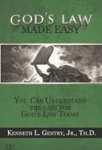 God’s Law Made Easy (by Ken Gentry)
God’s Law Made Easy (by Ken Gentry)
Summary for the case for the continuing relevance of God’s Law. A helpful summary of the argument from Greg L. Bahnsen’s Theonomy in Christian Ethics.
See more study materials at: www.KennethGentry.com
2. God’s Law in Paul’s ethical system
Paul clearly states in his preceding argument (1 Co 9:19-20) that he does not keep the ceremonial strictures of the old covenant typological economy. That is, those Jewish-defining, ritual obligations demarcating Jews from the Gentiles. Then he quickly and immediately adds: “though not being without the law of God,” that is, “though I am not without the law of God.”
The phrase “though not being without the law of God” shows the abiding relevance of “the law of God” in Paul’s ethical system. He most definitely is not without God’s Law. He carefully adds to his previous statement that even though he is opposed to mandatory observation of ceremonial features of the Law, he is not thereby “without the law of God.” This insertion is necessary to protect Paul’s argument from suggesting he endorses anomia, “lawlessness,” the word he employs in his statement “without the law of God.”
Furthermore, this phrase harmonizes with his other observations on the continuing validity of God’s Law as an ethical (not ceremonial) obligation in Paul’s writings: Romans 3:31; 7:12; 8:3-4; 1 Timothy 1:8-11; and so forth.
3. Paul’s point of contrast in his statement on law
Paul’s statement — “though not being without the law of God, but under the law of Christ” — must be carefully interpreted as written. He most definitely is not contrasting “the Law of God”with “the Law of Christ.” That is, he did not say: “I am not under law to God, but rather I am under law to Christ,” as if two, mutually-exclusive and competing ethical systems were juxtaposed against one another.
Note carefully the double-negative in Paul’s statement; double negatives can easily trip up the interpreter. Paul is not stating: “I am not under law to God”; rather he declares that he is “not without law to God.” A world of difference separates these two assertions. That is, he claims he is “not”in a state of being “without law to God.” Thus, he denies he is “without law to God” or that he is “apart from” the Law of God. Positively stated, therefore, he is actually affirming he is, in fact, “under law to God” by resolutely denying he is “without” law to God.
4. Paul’s liberty is in Christ, not against Christ
We must make several observations regarding the meaning of his tricky statement here:
First, when Paul refers to Christ’s “law” he appears to mean Christ’s “authority” (cp. Mt 28:18; Eph 1:21; Phil 2:9-10; Col 1:17-1) — not a new system of laws and obligations. Paul is under Christ’s lordship; he is Christ’s servant or slave (remember our exegesis of 9:16-17; note also 7:22). Paul’s fuller statement, then, asserts that his being “under law to God” is validated by being under Christ’s law or authority. Being a servant of Christ does not remove the obligation to God’s Law. Remember, the whole debate was engaged over the matter of Christian liberty (8:9; 9:1a, 19; cp. Gal 2:4); liberty in Christ. Here he is once again asserting that our liberty is not a wholesale, unbridled liberty, but one constrained by obligations to Christ himself.
In that Paul is highlighting the distinction between Jew and Gentile (9:19-21), he apparently assumes a distinction between being a servant of Moses (and under his ceremonial and ritual authority), as opposed to being a servant of Christ (with his superior authority, which fulfills those ceremonial obligations in himself). That is, he is under the new covenant in Christ rather than the old covenant administered by Moses. He is no longer obligated to Moses who was a “servant in God’s house,” but to Christ who is a “Son over the house” (Heb 3:2-6). The New Testament provides several examples of Christians’ being freed from ceremonial strictures because they are no longer “under Moses” but rather “under Christ.” For example, in Acts 6:14 we read: “we have heard him say that this Nazarene, Jesus, will destroy this place and alter the customs which Moses handed down to us.” See also: Acts 13:38-39; 15:1, 5; 21:21.
 Dispensational Distortions (3 downloadable mp3s)
Dispensational Distortions (3 downloadable mp3s)
by Ken Gentry
Reformed introduction to classic dispensationalism, with analysis of leading flaws regarding the Church, kingdom, redemptive history, and Christ. Helpful for demonstrating errors to dispensationalists.
See more study materials at: www.KennethGentry.com
Second, consider the strong adversative alla (ἀλλᾴ) in the phrase “not being without the law of God but (alla) under the law of Christ. This is another corrective to any misunderstanding of Paul, as well as a slap against the abusers of liberty. Not only is he not without the Law of God, but (strong disjunctive) he is under the authority of Christ. His original reader cannot jump on his “without law” statement and use the term anomos (ἄνομος) as if it meant “lawless,” because he not only asserts he is not without God’s Law, but is, in fact, under the authoritative lordship of Christ. This agrees with his statement of liberty asserting his freedom from “all men” (1 Cor 9:19a), while maintaining the Christocentric obligations within truly Christian liberty. Paul, then, is simultaneously under the Law of God and the authority of Christ; the two are mutually compatible and co-extensive.
Third, Paul’s using the phrase ennomos (ἔννομος: “in lawed”) to refer to Christ’s “authority” rather than employing the more common word exousia (ἐξουσία) is for literary reasons. Note his repetition of “law” (using various derivations of anomos [ἄνομος]) :
tois hupo nomon hos hupo nomon (to the ones under law as under law)
me hon autos hupo nomon (not being myself under law)
hina tous hupo nomon kerdeso; (in order that the ones under law I might gain);
tois anomois hos anomos (to the ones without law as without law)
me hon anomos theou (not being without law of God)
all’ ennomos Christou (but in law to Christ)
hina kerdano tous anomous (in order that I might win the ones without law)
When he refers to Christ’s authority over his liberty by using a derivative of nomos, Paul maintains his literary cadence, driving home his point in style with this effective word-play.
Theonomic Issue Completed
Clearly then, a careful reading of this verse exposes the error of anti-theonomic exegesis. Rather than undermining God’s Law as a continuing ethical obligation, Paul here establishes the Law as such — just as he told us he would in Romans 3:31: “Do we then nullify the Law through faith? May it never be! On the contrary, we establish the Law.”
October 24, 2023
CALVIN AND POSTMILLENNIALISM
PMW 2023-083 by Greg L. Bahnsen
INTRODUCTION
When we understand the distinctive character of postmillennialism (i.e., historical optimism”), it is important to go on and see that this position is not eccentric in terms of the outlook of orthodox theology, nor is it a recent innovation (associated, as some erroneously say, with the rise of nineteenth-century humanistic optimism). Rather, the postmillennial hope has been the persistent viewpoint of most Reformed scholars from the sixteenth century into the early twentieth century. In light of that fact, the position deserves to be examined again today for its biblical support and not lightly dismissed as somehow an obvious theological mistake. That is, there is no prima facie reason to reject postmillennialism as foreign to the thinking of the most respectable theological teachers or the unwitting parallel to specific secular movements. The position has been endorsed by the most dependable and outstanding theologians and commentators from the Reformation to the present.
Reformed theology (as distinguished from evangelical or Lutheran theology) takes as its father the indisputable theological master of the Protestant Reformation, John Calvin. The heritage of postmillennialism in Reformed theology can be traced to the Cavinian corpus of literature. J. A. De Jong, in his doctoral dissertation at the Free University of Amsterdam (As the Waters Cover the Sea), asserted that “John Calvin’s commentaries give some scholars cause for concluding that he anticipated the spread of the gospel and true religion to the ends of the earth.” J. T. McNeill, the editor of Calvin’s Institutes of the Christian Religion for the Library of Christian Classics, speaks of “Calvin’s conception of the victory and future universality of Christ’s Kingdom throughout the human race, a topic frequently introduced in the Commentaries.” In his recent study, The Puritan Hope, Iain H. Murray stated that “Calvin believed that Christ’s kingdom is already established, and, unlike Luther, he expected it to have a yet greater triumph in history prior to the consummation.” The judgment of these men (and those secondary sources upon which they depend) is certainly well grounded in Calvin’s writings.
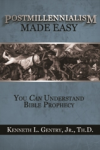
Postmillennialism Made Easy (by Ken Gentry)
Basic introduction to postmillennialism. Presents the essence of the postmillennial argument and answers the leading objections. And all in a succinct, introductory fashion.
See more study materials at: www.KennethGentry.com
OPPOSING PREMILLENNIALISM
About the view that Christ would have a literal one-thousand-year reign upon the earth (namely, premillennialism), Calvin said this “fiction is too childish either to need or to be worth a refutation.” At the same time, he indicated his implicit disagreement with the view (fostered by later amillennilalists) that the millennium pertains to the intermediate state of the saints (i.e., their disembodied heavenly rest subsequent to physical death and prior to the general resurrection); according to Calvin, the “one thousand” of Revelation 20 pertains to “the church while still toiling on earth.”
Nor would Calvin have agreed with the position that says the millennial triumph of the saints is simply the spiritual (invisible) victories in the Christian’s heart or the internal blessings privately experienced by the church (namely, one school of amillennial interpretation). With particular application to the kingdom of Christ, he said, “it would not have been enough for the kingdom to have flourished internally.” Calvin saw the Psalmist as saying that the prosperity and strength of the King of God’s choosing must be visible and publicly acknowledged; Christ must be shown victorious over all His enemies in this world, and His kingdom must be demonstrated to be immune from the various agitations currently experienced in the world.
COMMENTS ON 2 THESSALONIANS
In his commentary on II Thessalonians 2:8, Calvin declared:
“Paul, however, intimates Christ will in the meantime, by the rays which he will emit previously to his advent, put to flight the darkness in which antichrist will reign, just as the sun, before he is seen by us, chases away the darkness of the night by the pouring forth of his rays.
“This victory of the word, therefore, will show itself in this world . . .. He also furnished Christ with these very arms, that he may rout his enemies. This is a signal commendation of true and sound doctrine – that it is represented as sufficient for putting an end to all impiety, and as destined to be invariably victorious, in opposition to all the machinations of Satan” . . .[emphasis added].
For Calvin, the kingdom of Christ was viewed as established at the first advent and continuing in force until the second advent. Durint this interadventual period, the church is destined to experience widespread success; throughout history it will bring all nations under the sovereign sway of Christ. To this interadventual period Calvin referred many of the glorious prophecies about the Messiah’s kingdom found in the Old Testament. “The saints began to reign under heaven when Christ ushered in his kingdom by the promulgation of his Gospel.”
COMMENTS ON ISAIAH
Commenting upon the Isaiah 65:17 prophecy of God’s creating new heavens and a new earth, Calvin said: “By these metaphors he promises a remarkable change of affairs; . . . but the greatest of such a blessing, which was to be manifested at the coming of Christ, could not be described in any other way. Nor does he mean only the first coming, but the whole reign, which must be extended as far as to the last coming . . .. Thus the world is (so to speak) renewed by Christ . . . and even now we are in the progress and accomplishment of it . . .. The Prophet has in his eye the whole reign of Christ, down to its final close, which is also called ‘the day of renovation and restoration.’ (Acts iii.21)” “The glory of God shines . . . never more brightly than in the cross, in which . . . the whole world was renewed and all things restored to order.”
About Isaiah 2:2-4, Calvin had the following to say: “ . . . while the fullness of days began at the coming of Christ, it flows on in uninterrupted progress until he appears the second time for our salvation.” During this time “the church, which had formerly been, as it were, shut up in a corner, would now be collected from every quarter . . .. The Prophet here shows that the boundaries of his kingdom will be enlarged that he may rule over various nations . . .. Christ is not sent to the Jews only, that he may reign over them, but that he may hold sway over the whole world.” The triumphant progress of the church, reigning under Christ, will be remarkable down through history; the soteric restoration of the world will be increasingly evident as all nations come under the rule of the Savior. Such was Calvin’s hope, his biblical philosophy of history.
The scepter of Christ’s kingdom by which He rules is “his Word alone,” and Satan with his power fails to the extent that christ’s kingdom is upbuilt through the power of preaching. Calvin boldly proclaimed that “the labour of Christ, and of the whole Church, will be glorious, not only before God, but likewise before men . . .. Hence it follows, that we ought to have good hopes of success.” “We must not doubt that our Lord will come at last to break through all the undertakings of men and make a passage for his word. Let us hope boldly, then, more than we can understand; he will still surpass our opinion and our hope.”
[image error]For more information and to purchase click here.
" data-image-caption="" data-medium-file="https://postmillennialismtoday.files...." data-large-file="https://postmillennialismtoday.files...." class="alignright size-full wp-image-213" src="https://postmillennialismtoday.files...." alt="Predestination Made Easy" />Predestination Made Easy
(by Ken Gentry)
A thoroughly biblical, extremely practical, and impressively clear presentation of
the doctrine of absolute predestination.
See more study materials at: www.KennethGentry.com
COMMENTS ON THE LORD’S PRAYER
The confidence of the Reformer was clearly expressed in his expositions of the Lord’s Prayer at the second petition (“Thy kingdom come”): “now, because the word of God is like a royal scepter, we are bidden here to entreat him to bring all men’s minds and hearts into voluntary obedience to it. . .. Therefore God sets up his Kingdom by humbling the whole world . . .. We must daily desire that God gather churches unto himself from all parts of the earth; that he spread and increase them in number; . . . that he cast down all enemies of pure teaching and religion; that he scatter their counsels and crush their efforts. From this it appears that zeal for daily progress is not enjoined upon us in vain . . .. With ever-increasing splendor, he displays his light and truth, by which the darkness and falsehoods of Satan’s kingdom vanish, are extinguished, and pass away . . .. [God] is said to reign among men, when they voluntarily devote and submit themselves to be governed by him . . .. by this prayer we ask, that he may remove all hindrances, and may bring all men under his dominion . . .. The substance of this prayer is, that God would enlighten the world by the light of his Word, — would form the hearts of men, by the influences of his Spirit, to obey his justice, — and would restore to order, by the gracious exercise of his power, all the disorder that exists in the world . . .. Again, as the kingdom of God is continually growing and advancing to the end of the world, we must pray every day that it may come: for to whatever extent iniquity abounds in the world, to such an extent the kingdom of God, which brings along with it perfect righteousness, is not yet come.” This prayer for the evident success of the Great commission will not be in vain, according to Calvin; our hope for success should be bold, for we must not doubt that christ will accomplish this purpose in the world. Here we have the postmillennial vision for preconsummation history.
OTHER OBSERVATIONS
Calvin’s belief that the nations will be discipled and become obedient to Christ’s word was expressed over and over again in his writings. “Our doctrine must stand sublime above all the glory of the world, invincible by all its power, because it is not ours, but that of the living God and his Anointed, whom the Father has appointed king that he may rule from sea to sea, and from the rivers even to the ends of the earth; and so rule as to smite the whole earth and its strength of iron and brass, its splendor of gold and silver, with the mere rod of his mouth, and break them in pieces like a potter’s vessel; according to the magnificent predictions of the prophets respecting his kingdom (Dan. 2.34; Isa. 11.4; Psa. 2.9).”
“God not only protects and defends [the kingdom of Christ], but also extends its boundaries far and wide, and then preserves and carries it forward in uninterrupted progression to eternity . . .. We must not judge of its stability from the present appearances of things, but from the promise, which assures us of its continuance and of its constant increase.” “The Lord opens his reign with a feeble and despicable commencement for the express purpose, that his power may be more fully illustrated by its unexpected progress.”
In commenting upon Isaiah 54:1-2, Calvin speaks of the “extraordinary fertility of the Church” as the kingdom is increased, and he uses the image of growth from childhood to manhood in explaining that “the work of God will be extraordinary and wonderful.” With reference to Psalm 67, Calvin calls attention to the new and unprecedented blessing that will come when the Gentiles are called and all nations participate in the saving knowledge of God; as the word of salvation is diffused throughout all the earth, said Calvin, all the ends of the earth will submit themselves to the divine government. At Psalm 22:27 (“All ends of the earth shall remember and turn to Jehovah”) Calvin again speaks of the whole world giving the willing obedience of true godliness to the promised Messiah.
The triumphant reign of the Messiah over the entire world will be accomplished as the nations come to a saving knowledge of God, held Calvin. “The knowledge of God shall be spread throughout the whole world; . . . the glory of God shall be known in every part of the world.” In his Sermons on the pastoral epistles, Calvin declared that “the knowledge of God must shine generally throughout all the world and every one must be a partaker of it”; therefore, “we must take pains to bring all them that wander out of the way of salvation: and we must not lonely think upon it for our life time, but for after our death.”[49] It was precisely because of Calvin’s confidence in Scripture’s promise that the gospel would be so prosperous as to bring the nations to submission to Christ that he alone was active in sending out missionaries – unlike the medievals and his fellow Reformers, who expected the imminent end of the world (e.g., Luther expected it in his own lifetime).
Because Christ has committed to ministers “his Gospel, which is the sceptre of his kingdom, . . . they exercise in some sort his power” – a power by which they subdue to Christ’s dominion the whole world. According to Calvin, Psalm 47 “contains . . . a prophecy of the future kingdom of Christ. It teaches that the glory which then shone under the figure of the material sanctuary will diffuse its splendor far and wide; when God himself will cause the beams of his grace to shine into distant lands, that kings and nations may be united into fellowship with the children of Abraham.” “When God is called a terrible and great King over all the earth, this prophecy applies to the kingdom of Christ . . .. The prophet, then, when he declares that the Gentiles will be subdued, so that they will not refuse to obey the chosen people, is describing that kingdom of which he had previously spoken. We are not to suppose that he here treats of that secret providence by which God governs the whole world, but of the special power which he exercises by means of his word . . .. By these words he intimates that the kingdom of God . . . would be extended to the utmost boundaries of the earth . . . so as to occupy the whole world from one end to the other.” “The Church shall not be limited to any corner of the world, but shall be extended as far and wide as there shall be space throughout the whole world.”
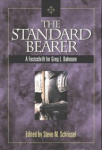
Standard Bearer: Festschrift for Greg Bahnsen (ed. by Steve Schlissel)
Includes two chapters by Gentry on Revelation and theonomy. Also chapters on apologetics, politics, ecclesiology, covenant, and more.
See more study materials at: www.KennethGentry.com
It must be clear by this point that Calvin endorsed the central tenet of postmillennialism, the optimistic confidence that the gospel of Christ shall convert the vast majority of the world some time prior to the return of the Lord in judgment and glory. Speaking of Psalm 72, Calvin taught that “the kingdom of Christ . . . was to be extended from he rising of the sun to the going down thereof . . .. The meaning then is, that the king chosen by God in Judea will obtain so complete a victory over all his enemies, far and wide, that they shall come humbly to pay him homage . . .. This verse [11] contains a more distinct statement of the truth, That the whole world will be brought in subjection to the authority of Christ . . .. The nations will be convinced that nothing is more desirable than to receive from him laws and ordinances . . .. David . . . breaks forth in praising God, because he was assured by the divine oracle that his prayers would not be in vain . . .. David, therefore, with good reason prays that the glory of the divine name may fill the whole earth, since that kingdom was to be extended even to the uttermost boundaries of the globe.”
Expressions of this conviction are manifold throughout the commentaries. For instance, “ . . . the Father will deny nothing to his Son which relates to the extension of his kingdom to the uttermost parts of the earth.” In the same place Calvin indicates that he understood Psalm 2 to predict that men will subdue the whole world to Himself and embrace all lands and nations under His dominion. In introducing Psalm 110, he explains: “In this psalm David sets forth the perpetuity of Christ’s reign, and the eternality of his priesthood; and, in the first place, he affirms, That God conferred upon Christ supreme dominion, combined with invincible power, with which he either conquers all his enemies, or compels them to submit to him. In the second place, he adds, That God would extend the boundaries of this kingdom far and wide . . .. Christ should not reign as King upon Mount Zion only, because God would cause his power to extend to the remotest regions of the earth.” Calvin adds that this kingdom continues to spread and prosper.
Of the scope of this prosperity, Calvin said: “The import of the whole is, that Christ would so rule far and wide, that the farthest would live contentedly under his protection, and not cast off the yoke laid on them.” “The worship of God will flourish everywhere . . .. The law which had been given to the Jews would be proclaimed among all nations, so that true religion might be spread everywhere . . .. since then it is necessary that the worship of God should be based on the truth, when God declares that his name would become renowned in every place, he doubtless shows that his law would be known to all nations, so that his will might be known everywhere . . ..” Lest there be any misunderstanding of Calvin’s meaning, it should be observed that in his Isaiah Commentary he makes it abundantly clear that these prophecies of prosperity and worldwide growth do not pertain simply to an ordinary effect of the gospel on the nations; the prophets envision not merely the placing of the church in a few localities over the earth, but rather the extraordinary – indeed, incredible – triumph of the kingdom through the world. The church goes forth, not simply to battle (with periodic or spotted conversions from place to place), but to incredible victory (namely, the discipling of the nations as such.) “Although those things which the Lord promises are concealed, for a time, from the eyes of men, yet believers perceive them by faith; so that they have a firm belief and expectation of the accomplishment of them, however incredible they may appear to others . . .. He speaks of the extension of the Church which he had formerly mentioned; but it was of great importance that the same things should be frequently repeated, because it appeared to be incredible that the Church . . . would be restored and spread throughout the whole world . . . to the astonishment of all . . . spread far and wide through every part of the world.” In the same place Calvin spoke of “obedience, which the whole world shall render to God in the church.” With the infallible truth of god’s word as his foundation and confidence, then, Calvin affirmed, “there is nothing which we ought to desire more earnestly than that the whole world should bow to the authority of God.”
A further insight to Calvin’s optimistic philosophy of preconsummation history is afforded us in his prayers. Two examples are offered here. The Reformer’s strength of faith is evident as he prayed, “Grant, I say, that we may raise our eyes upward, and consider how much power thou has conferred upon thine only-begotten Son. Grant, also, that he may rule and govern us by his spirit, protect us by his faithfulness and guardianship, and compel the whole world to promote our salvation.” In the same lecture series he prayed, “May we never grow weary, but learn to overcome the whole world….”
After Hosea Lecture 34, Calvin prayed: “O grant that we, being mindful of these benefits may ever submit ourselves to thee, and desire only to raise our voice for this end, that the whole world may submit itself to thee, and that those who seem now to rage against thee may at length be brought, as well as we, to render thee obedience, so that thy Son Christ may be Lord of all . . ..” Calvin’s biblically grounded hope shines forth with brilliance in his prayer, “May we daily solicit thee in our prayers, and never doubt, but that under the government of thy Christ, thou canst again gather together the whole world, though it be miserably dispersed, so that we may persevere in this warfare to the end, until we shall at length know that we have not in vain hoped in thee, and that our prayers have not been in vain, when Christ shall exercise the power given to him for our salvation and for that of the whole world.”
CONCLUSION
Thus we conclude that Reformed theology was launched with a postmillennial perspective, a heart-felt confidence in the promises of Scripture to the effect that Christ would subdue the whole world with the gospel. The dogmatics, commentaries, and prayers of Calvin form a beautiful and orchestrated presentation of an eschatological hope which would become a doctrinal distinctive and motivating power throughout the history of Reformed Christianity.
Click on the following images for more information on these studies:



October 20, 2023
MISGUIDED REJECTIONS OF POSTMILLENNIALISM (2)
PMW 2023-082 by Greg L. Bahnsen
Gentry note:
In the previous posting, Bahnsen noted the misguided and failed attempts to dismiss postmillennialism based on (1) newspaper exegesis, (2) misrepresentation, and (3) the application of two-edged criticism (which applies to the critic as well as the position criticized). In this posting he continues.
OT VS. NT ISSUE
There are current day charges against the position which are premature or unfounded. To this category belongs the allegation that postmillennialism is founded on Old Testament passages rather than New Testament evidence, that the New Testament knows nothing of the proclamation of a semi-golden age.
Such statements do not bear their own weight in the face of postmillennial appeals to New Testament passages like the kingdom growth parables of Matthew 13, the apostle John’s teachings about the overcoming of Satan and the world (e.g., John 12:31-32; 16:33; I John 2:13-14; 3:8; 4:4, 14; 5:4-5), Peter’s Pentecost address (Acts 2:32-36, 41), Paul’s declaration that all Israel shall be saved (Rom. 11:25-32), his resurrection victory chapter in I Corinthians 15 (esp. vv. 20-26, 57-58), the statements of Hebrews 1-2 about the subjection of all enemies to Christ in the post-ascension era (1:8-9, 13; 2:5-9), and numerous passages from Revelation, notably about the vastness of the redeemed (7:9_10), the open door for missionary triumph and the Christian’s reign with Christ over the nations (2:25-27; 3:7-9), the submission of the kingdoms of this world to the kingdom of Christ (11:15), and the utter victory of gospel proclamation (19:11-21). Opponents of postmillennialism may wish to dispute its interpretation of such passages, but it is groundless for them to allege without qualifications and without detailed interaction with postmillennial writings that the position is not taken from the New Testament itself.
[image error]For more information and to order click here.
" data-image-caption="" data-medium-file="https://postmillennialismtoday.files...." data-large-file="https://postmillennialismtoday.files...." class="alignright size-full wp-image-211" src="https://postmillennialismtoday.files...." alt="" />Perilous Times: A Study in Eschatological Evil (by Ken Gentry)
Technical studies on Daniel’s Seventy Weeks, the great tribulation, Paul’s Man of Sin, and John’s Revelation.
See more study materials at: www.KennethGentry.com
HISTORY VS. ETERNITY
Further premature criticisms would include Walvoord’s accusation that postmillennialism obscures the doctrine of Christ’s second coming by including it in God’s providential works in history, and Adams’ charge that it confounds the millennium with the eternal state – since it takes Old Testament prophecies of kingdom peace and prosperity and illegitimately applies them to the New Testament mention of the millennium, and thereby winds up with the dilemma that either there is no need for a new heavens and earth (to which the Old Testament prophecies really apply) or else the millennium is frustrated.
Walvoord has failed to grasp adequately the postmillennialist’s philosophy of history; it is not the case that the postmillennialist fails to distinguish providence from consummation, but rather that he sees providence as well orchestrated to subserve the ultimate ends of consummation. And in connection with this understanding, he recognizes that the New Testament speaks of Christ “coming” in various ways (contrary to Walvoord’s apparent thought that there is only one single sense in which Christ “comes,” namely, at his return in glory) – for example, in the first-century establishment of his kingdom (Matt. 16:28), in the person of the Holy spirit at Pentecost (John 14:18, 28; cf. vs. 16; Acts 2:33; I Cor 15:45; II Cor. 3:17), in fellowship with the repentant and obedient believer (Rev. 3:20; John 14;21-23), in historical judgment upon nations (Matt. 24:29-30, 34; Mark 14:61-62), and upon churches (Rev. 2:5, 16). Such “comings” of the Lord are part of God’s providential government of pre-consummation history and are in addition to Christ’s visible and glorious coming in final judgment (II Thess. 1:7-10). The postmillennialist does not obscure the second coming with providence.
Nor does he, as Adams said, confound the millennium with the eternal state; the postmillennialist clearly knows the difference between the two. It is just that he disagrees with Adams that certain Old Testament prophecies pertain exclusively to the eternal state. Prior to the amillennialists and postmillennialists engaging in full exegetical debate over such passages, it would be just as legitimate for the postmillennialist to accuse Adams of confounding the eternal state with the millennium. The postmillennialist has a sound rationale for connecting relevant Old Testament passages with the New Testament millennium, in that these passages (according to postmillennialist claims) speak of the pre-consummation prosperity of Christ’s kingdom, and the millennium is precisely the pre-consummation form of his kingdom. Such Old Testament passages are taken to be (at least in part) predictions concerning a pre-consummation state of affairs because they speak of things which are inappropriate to the eternal state (e.g., opposition to the kingdom, evangelism, kingdom growth, national interaction, death, etc.). Again, the opponents of postmillennialism may dispute its interpretation of such passages, but it is premature to accuse the position of confounding two openly recognized distinct entities (namely, the millennium and eternity) prior to refuting the exegetical reasoning of the position. Postmillennialism is not suspect in advance, any more than amillennialism is.

Perspectives on Pentecost (Richard Gaffin)
A careful examination of the New Testament teaching on the gifts of the Spirit. Makes a case for the cessation of tongues at the close of the apostolic era. Gaffin is professor emeritus of biblical and systematic theology at Westminster Theological Seminary, Philadelphia.
See more study materials at: www.KennethGentry.com
INADEQUATE PROSPECTS
A further groundless criticism of postmillennialism as a system is Adams’ claim that it has even less reason to expect a semi-golden age in history than does the premillennialist, since there is nothing but sinful, non-glorified humanity to produce it, and that it has no explanation for the anticipated sudden change of conditions in the world at the end of history. Such statements are unwarranted, for the postmillennialist sees the powerful presence of Christ through the Holy spirit as sufficient reason to expect the release of Satan from the post-resurrection restraints on his deceiving power over the nations as adequate explanation of the change of world conditions at the very end of the age (just as Adams does). Such tenets have been made well known in postmillennial teaching, and thus Adams’ criticism is an obvious oversight of what is an important element of the position criticized.
A similar reply is called for with respect to Walvoord’s criticism that postmillennialism deprives today’s believer of the hope of Christ’s imminent return. The fact is that postmillennial never claimed to salvage the doctrine of the any-moment return of Christ; indeed, distinctive to it is the denial of the imminent physical return. The New Testament definitely indicates that the coming of the Lord is a delayed event, and that the Christian should expect to see precursor signs of its approach. It is not to come upon him as an unexpected thief (I Thess. 5:4), for he believes the Scriptures that certain things must first occur (cf. II Thess. 2:1-3, etc.). Indeed, it was the error of the foolish virgins to expect the imminent coming of the bridegroom (Matt. 25:1-8). Hence postmillennialism can hardly be faulted for not preserving a doctrine which it does not, by the very nature of its position, think should be preserved (cf. Matt. 25:5, 10).
We must conclude, then, that current day writers have offered no good prima facie reason for ignoring or rejecting postmillennialism as an important theological option for biblical believers. It has been unwarrantedly dismissed in the past fifty years on the basis of newspaper exegesis, misrepresentation, two-edged criticisms, and premature or unfounded charges. Postmillennialism deserves to be taken seriously and considered in the light of Scripture; quick dismissal or ignoring of it in recent years has no good justification.
Click on the following images for more information on these studies:


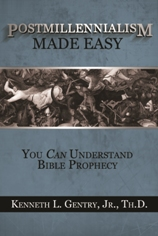
October 17, 2023
MISGUIDED REJECTIONS OF POSTMILLENNIALISM (1)
 PMW 2023-081 by Greg L. Bahnsen
PMW 2023-081 by Greg L. Bahnsen
It must be observed that postmillennialism lost favor (and today remains held in disfavor) with conservative theologians for manifestly unorthodox and insufficient reasons. Extra-biblical reasoning, as well as lazy or poor scholarship, has intruded itself into Christian discussions of eschatology.
NEWSPAPER EXEGESIS
Alva J. McClain says of postmillennialism: “This optimistic theory of human progress had much of its own way for the half-century ending in World War I of 1914. After that the foundations were badly shaken; prop after prop went down, until today the whole theory is under attack from every side. Devout Postmillennialism has virtually disappeared.”
J. Barton Payne’s massive Encyclopedia of Biblical Prophecy mentions postmillennialism only once, and that merely in a footnote which parenthetically declares “two world wars killed this optimism.”
Merrill F. Unger dismisses postmillennialism in short order, declaring: “This theory, largely disproved by the progress of history, is practically a dead issue.”
John F. Walvoord tells us that “In eschatology the trend away from postmillennialism became almost a rout with the advent of World War II” because it forced upon Christians “a realistic appraisal of the decline of the church in power and influence.” Hence he says that “In the twentieth century the course of history, progress in Biblical studies, and the changing attitude of philosophy arrested its progress and brought about its apparent discard by all schools of theology. Postmillennialism is not a current issue in millenarianism.” He accuses it of failing to fit the facts of current history, of being unrealistic, and of being outmoded and out of step.
Jay Adams recognizes postmillennialism as a “dead issue” with conservative scholars, since it predicts a golden age while the world awaits momentary destruction; he agrees with the above authors that the “advent of two World Wars . . . virtually rang the death knell upon conservative postmillennialism.” Adams apparently offers his own opinion that Boettner’s long-range postmillennialism “is too difficult to grant when Christians must face the fact of hydrogen bombs in the hands of depraved humanity.”
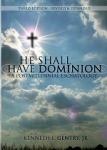
He Shall Have Dominion
(paperback by Kenneth Gentry)
A classic, thorough explanation and defense of postmillennialism (600+ pages). Complete with several chapters answering specific objections.
See more study materials at: www.KennethGentry.com
Hal Lindsey’s The Late Great Planet Earth captures well the attitude of these previous writers, stating that “there used to be” a group called “postmillennialists” who were greatly disheartened by World War I and virtually wiped out by World War II. Lindsey’s (poorly researched) conclusion is this: “No self-respecting scholar who looks at the world conditions and the accelerating decline of Christian influence today is a ‘postmillennialist.’”
The sad fact is that our Christian brothers mentioned above should be embarrassed by what they have written and concluded; the attitude and reasoning they have set forth is woefully lacking as respectable Christian scholarship. By means of such newspaper exegesis, one could just as well discount the return of Christ in glory, saying “where is the promise of his coming?” (cf. II Peter 3:1-4). This reductio ad absurdum must be reckoned with. The fact that an era of gospel prosperity and world peace has not yet arrived would no more disprove the Bible’s teaching that such an era shall be realized (in the power of God’s spirit and the faithfulness of Christ’s church to its great commission) than the fact that Christ has not yet returned disproves the Bible’s teaching that such an event shall take place!
The only question is whether the Bible actually teaches these things. If it does, then “let God be true but every man a liar” (Rom. 3:4). The newspaper has no prerogative to challenge God’s word of truth. Nor do those who read the newspapers. As faithful disciples of Christ, we are to trust God as the sovereign controller over human history, “who works all things after the counsel of His own will” (Eph. 1:11), “declaring the end from the beginning and from ancient times things not yet done, saying, ‘My counsel shall stand, and I will accomplish all my purpose’” (Isa. 46:10), so that “none can stay his hand” (Dan. 4:35). With the Psalmist we should declare, “Whatever the Lord pleases, he does, in heaven and on earth” (115:3). If God says something is to happen, then it shall happen; it is to our discredit if we are men of little faith with respect to his promises.
Just imagine the following scenario: devout Simeon is in the temple looking for the consolation of Israel (cf. Luke 2), when a popular Jewish theologian comes in and tells him, “Simeon, your hope of a personal Messiah is a dead issue, an idealistic anachronism. Your unrealistic theory has been disproved by the course of history and discarded by all schools; it is out of date, outmoded, and no longer a current issue. No self-respecting scholar who looks at the world conditions and remembers the four hundred years of silence from God believes as you do; prop after prop has gone down, and the events that have come upon our nation have killed the optimism of your theory.” Would any conservative theologian say that Simeon’s belief had been refuted or incapacitated by such considerations? Would any think him justified in no longer treating it as a vital position worthy of scriptural consideration? Of course not. Likewise biblical postmillennialism cannot be thus dismissed.
MISREPRESENTATION
Postmillennialism has not only been discarded in this century on clearly unorthodox grounds; it has also been made a straw man so that modern advocates of the other schools of interpretation can easily knock it down and get on to other interests. The worst possible interpretation is put on postmillennial tenets, or the eccentric aspect of some postmillennial writer’s position is set forth as representing the basic school of thought.
As instances of these procedures we can note the following. Hal Lindsey says that postmillennialists believe in the inherent goodness of man, and Walvoord says that the position could not resist the trend toward liberalism. He also accuses it of not seeing the kingdom as consummated by the Second Advent. William E. Cox claims that postmillennialism is characterized by a literal interpretation of Revelation 20. Adams portrays the postmillennialist as unable to conceive of the millennium as coextensive with the church age or as a present reality, for he (according to Adams) must see it as exclusively future – a golden age just around the corner.
All of the above claims are simply inaccurate. The Calvinist, Loraine Boettner, certainly does not believe in man’s inherent goodness, and B. B. Warfield can hardly be accused of not resisting liberalism. That a. A. Hodge did not see the second coming of Christ as the great day of consummation is preposterous. J. Marcellus Kik and many others insisted on a figurative interpretation of Revelation 20. Certain sixteenth- and seventeenth-century Dutch theologians, as well as Jonathan Edwards and E. W. Hengstenberg, were all postmillennialists who saw the millennium as coeval with the interadventual age (in which there would be progressive growth for the church in numbers and influence). Charles Hodge, Snowden, and Boettner were all postmillennialists who explained that the growth of Christ’s kingdom in the world suffers periodic crises, and Boetner has especially stressed the fact that it grows by imperceptible degrees over a long period.
Finally, anyone who thinks of postmillennialism as a utopian position misunderstands one or the other in their historically essential principles. Indeed, a chapter in Boettner’s book, The Millennium, is entitled, “The Millennium not a Perfect or Sinless State,” contrary to the misrepresentations of Vos. Therefore, the recent opponents of postmillennialism have not been fair to its genuine distinctives, but rather have misrepresented it as a general category of interpretation. This surely provides no firm ground for rejecting the position.
[image error]For more information and to order click here.
" data-image-caption="" data-medium-file="https://postmillennialismtoday.files...." data-large-file="https://postmillennialismtoday.files...." class="alignright size-full wp-image-209" src="https://postmillennialismtoday.files...." alt="Navigating the Book of Revelation: Special Studies on Important Issues" />Navigating the Book of Revelation (by Ken Gentry)
Technical studies on key issues in Revelation, including the seven-sealed scroll, the cast out temple, Jewish persecution of Christianity, the Babylonian Harlot, and more.
See more study materials at: www.KennethGentry.com
TWO-EDGED CRITICISMS
A third infelicitous way in which postmillennialism has been disposed of is by means of (allegedly) critical considerations which in fact apply as much to the other eschatological positions as to postmillennialism. For example, it has been contended that there is incoherence among various postmillennials rather than a unified theology, and in connection with this criticism it is observed that postmillennialism is adhered to by extremely divergent theological schools. However, this is just as true of amillennialism and premillennialism; numerous details differ among proponents of these positions (indeed, one is inclined to think that they are more extensive and significant differences than those among proponents of these positions (indeed, one is inclined to think that they are more extensive and significant differences than those among postmillennialists), but this says nothing about the truth of their central tenets.
Then again, postmillennialism is sometimes thought to be falsified through imputing guilt to it by association, observing that it has sometimes been held in some form by unitarians and liberals. But “premillennialism” has been advocated by the apostate Jews and modern cultists, and “amillennialism” is endorsed by neo-orthodox dialectical theology. The fact that there are functional similarities between various evangelical and heretical theologians does not in itself settle the key question of which position is taught by God’s word; whichever millennial position is scriptural, it is nonetheless subject to misuse and inappropriation. Hence the use of one of these positions by an unorthodox writer does nothing in itself to discredit the position.
FIGURATIVE VS. LITERAL
A further criticism which cannot be applied uniquely to postmillennialism is that it interprets biblical prophecy both figuratively and literally. The premillennialists see symbolic interpretation as a failure of nerve, and amillennialists take literal understanding of prophecy as crude and insensitive. But the fact remains that none of the three schools interprets biblical prophecy exclusively in either a literal or figurative fashion. (And, by the way, nobody really adheres to the rule, “Literal where possible,” as is evident from the respective treatments of the beast of Revelation, which could possibly be a literal monster but obviously is not.)
All three schools end up finding both kinds of literature in the prophetic passages, and it is dishonest to give an opposite impression. If anything, the fact that postmillennialism is seen as too literal by amillennialists and too figurative by premillennialists perhaps suggests (certainly does not prove) that it alone has maintained a proper balance. The upshot is this: the charge of subjective spiritualization or hyperliteralism against any of the three eschatological positions cannot be settled in general; rather, the opponents must get down to hand-to-hand exegetical combat on particular passages and phrases.
Click on the following images for more information on these studies:
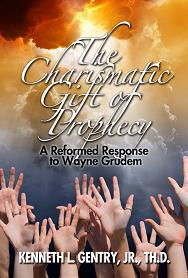
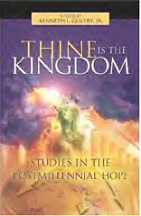
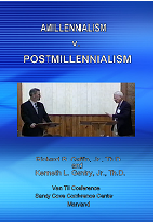
Kenneth L. Gentry Jr.'s Blog
- Kenneth L. Gentry Jr.'s profile
- 85 followers



